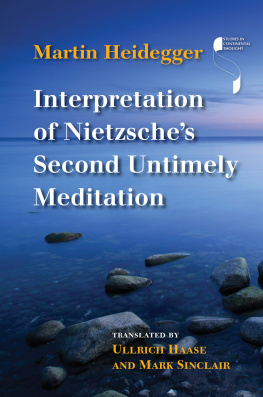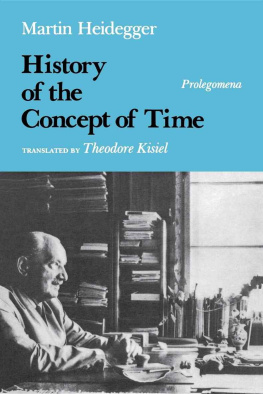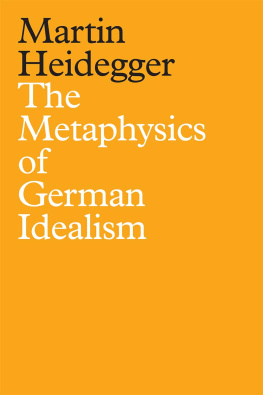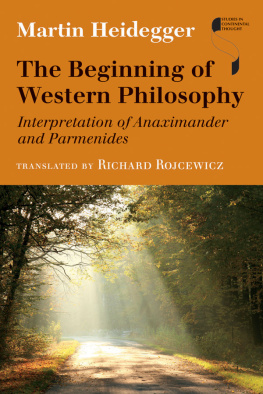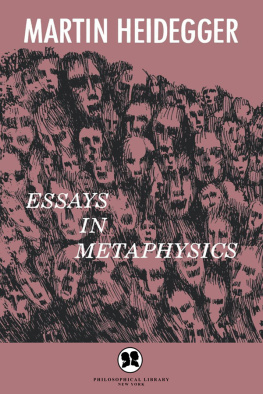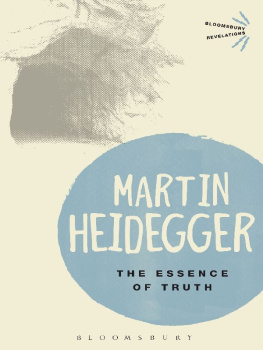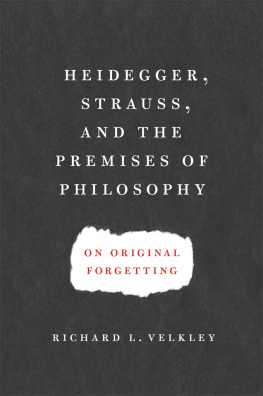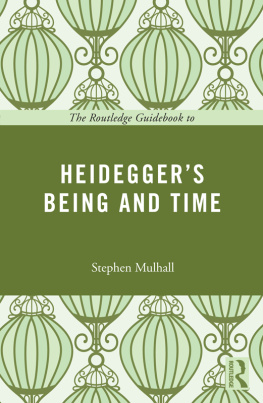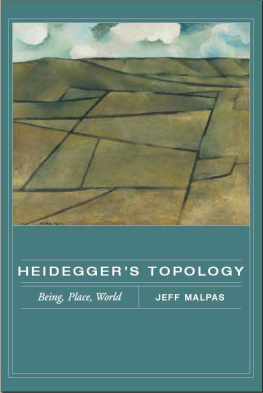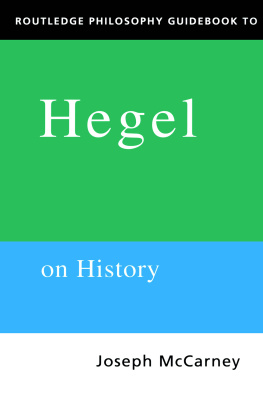
Interpretation of Nietzsches Second Untimely Meditation
Studies in Continental Thought
EDITOR
JOHN SALLIS
CONSULTING EDITORS
Robert Bernasconi | James Risser |
John D. Caputo | Dennis J. Schmidt |
David Carr | Calvin O. Schrag |
Edward S. Casey | Charles E. Scott |
David Farrell Krell | Daniela Vallega-Neu |
Lenore Langsdorf | David Wood |
Martin Heidegger
Interpretation of Nietzsches Second Untimely Meditation
Translated by
Ullrich Haase and Mark Sinclair
Indiana University Press
Bloomington and Indianapolis
This book is a publication of
Indiana University Press
Office of Scholarly Publishing
Herman B Wells Library 350
1320 East 10th Street
Bloomington, Indiana 47405 USA
iupress.indiana.edu
Published in German as Martin Heidegger Gesamtausgabe 46, Zur Auslegung von Nietzsches II. Unzeitgemer Betrachtung, edited by Hans-Joachim Friedrich
2003 by Vittorio Klostermann GmbH, Frankfurt am Main
English translation 2016 by Indiana University Press
All rights reserved
No part of this book may be reproduced or utilized in any form or by any means, electronic or mechanical, including photocopying and recording, or by any information storage and retrieval system, without permission in writing from the publisher. The Association of American University Presses Resolution on Permissions constitutes the only exception to this prohibition.
The paper used in this publication meets the minimum requirements of the American National Standard for Information SciencesPermanence of Paper for Printed Library Materials, ANSI Z39.48-1992.
Manufactured in the United States of America
Library of Congress Cataloging-in-Publication Data
Names: Heidegger, Martin, 18891976, author.
Title: Interpretation of Nietzsches Second untimely meditation / Martin Heidegger ; translated by Ullrich Haase and Mark Sinclair.
Other titles: Zur Auslegung von Nietzsches II. Unzeitgem?asser Betrachtung, Vom Nutzen und Nachteil der Historie f?ur das Leben. English
Description: Bloomington : Indiana University Press, 2016. | Series: Studies in Continental thought | Includes bibliographical references.
Identifiers: LCCN 2016012767 (print) | LCCN 2016030783 (ebook) | ISBN 9780253022660 (cloth : alk. paper) | ISBN 9780253023155 (ebook)
Subjects: LCSH: HistoryPhilosophy. | Metaphysics. | Nietzsche, Friedrich Wilhelm, 1844-1900. Vom Nutzen und Nachteil der Historie f?ur das Leben. | Philosophy, German19th century. | Philosophy, German20th century.
Classification: LCC B3279.H48 Z7513 2016 (print) |
LCC B3279.H48 (ebook) | DDC 193dc23
LC record available at https://lccn.loc.gov/2016012767
1 2 3 4 5 21 20 19 18 17 16
CONTENTS
B. SECTION I
Structure. Preparation and Preview of the Guiding Question. HistoriologyLife |
C. SECTION II
The Three Modes of Historiology
1. Monumental Historiology |
G. HISTORIOLOGY
Historiology and History. Historiology and the Unhistorical |
J. CONCERNING SECTIONS V AND VI
Truth. Justice. Objectivity. Horizon |
K. ON SECTIONS V AND VI
Historiology and Science (Truth)
(cf. J. Truth Justice Objectivity Horizon) |
L. SECTION VI
(Justice and Truth) |
O. THE QUESTION OF THE HUMAN BEING:
Language. Happiness. Language
(cf. 15, Forgetting and Remembering) |
P. THE FUNDAMENTAL STANCE OF THE
SECOND UNTIMELY MEDITATION |
Q. ANIMALITY AND LIFE.
Animal. (The Living Body.
cf. Lectures of Winter Semester 1929/30) |
T. STRUCTURE AND COMPOSITION OF THE
SECOND UNTIMELY MEDITATION |

TRANSLATORS INTRODUCTION
This volume is a translation of Martin Heideggers notes for a weekly seminar on Nietzsches second Untimely Meditation, On the Advantages and Disadvantages of History for Life (1874), held in the winter semester 19381939 in Freiburg. These notes were first published in German in 2003 as volume 46 of the Gesamtausgabe (GAComplete Edition) of Heideggers work. Although the notes were originally supposed to form the basis of seminar exercises, the number of students actually present meant they were delivered in the form of lectures, and this seems to be one reason why Heidegger chose to have the notes appear in the second division of the Gesamtausgabe, which contains his lecture courses, rather than in the fourth division containing notes and recordings.
In this lecture course, Heidegger returns to Nietzsches early essay On the Advantages and Disadvantages of History for Life, an essay that was of great importance for the development of his thought in the 1920s. Being and Time (1927) indicates clearly enough the positive influence that Nietzsches essay had for Heideggers project of fundamental ontology. In contrast, in his more critical readings of Nietzsche in the first set of his lectures on Nietzsches philosophy beginning in 1936 (GA 6.1), that Nietzsches early concern for truth as justice is, in fact, the core of his metaphysics. The present lecture course, then, is pivotal in Heideggers interpretation of Nietzsche, and in the development of that interpretation from the project of fundamental ontology to the Seinsgeschichtliche Auseinandersetzungthe confrontation in terms of the history of beingadvanced in the 1930s and 1940s. The lectures focus in particular on the underdetermined notion of life that appears in the title of Nietzsches essay to argue that this notion lies at the root of the later philosophy of the Will to Power. This is one of the key ways in which the present lecture course casts new light on Heideggers confrontation with Nietzsches philosophy.
Lecture course though it was, Heideggers notes are for the most part schematic and fragmentary. They contain incomplete sentences, diagrams and aides-mmoire, rather than a full transcript of what Heidegger actually said. This of course presents special difficulties for the translator. We have endeavored to reproduce the notes with as little textual intervention or embellishment as possible, but occasionally it has been necessary to add missing verbs or articles, for example, in order to avoid producing nonsensical and unduly impenetrable passages in English. Yet we have done so only in cases where the meaning presented by the German text was unambiguous.
We have followed the general principle, in line with other Heidegger translations in this series, of attempting to reproduce in English the effect that the notes would have on Heideggers German listeners and readers. This entails that ordinary German words that become terms of art with extraordinary senses are, as much as possible, translated by ordinary English words. Heideggers idea of being as Ereignis, for example, means something other than what we think of ordinarily as an event, and the German word contains rich etymological significance absent in the English, but it is nevertheless best translated by that English word. Similarly, the sense of Heideggers Auseinandersetzungliterally, a setting apartwith Nietzsche and other key thinkers in European philosophy might not be captured fully by the cognate English term
Next page
